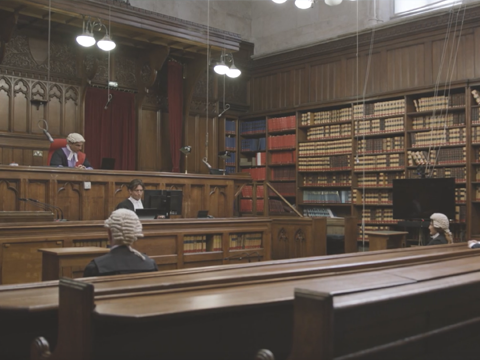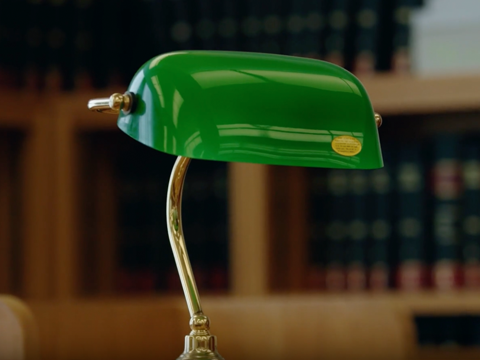Robbery transcript
You are about to see a shortened version of a hearing in the Crown Court relating to robbery.
At the end of the video, you will be asked what sentence you think would be appropriate for the defendant. Throughout the video, look out for aggravating factors and mitigating factors that will influence the sentence. Aggravating factors are circumstances that make the crime more serious. Mitigating factors are circumstances that make the offence less serious or matters relating to the offender that may lead the court to reduce the sentence.
Court clerk
Please stand. Are you Mr Adam Khan?
Defendant
I am.
Court clerk
You are charged that on the 17th of October last year you robbed Kelly Jones of a handbag containing personal items including her debit card in contravention of section 8 of the Theft Act 1968. How do you plead?
Defendant
Guilty.
Court clerk
Please take a seat.
Judge
Good morning. According to my notes, I have a Mr Bragg here representing the prosecution.
Prosecution barrister
Yes, Your Honour.
Judge
And a Mrs Ryder, here on behalf of the defendant, is that correct?
Defence barrister
That’s correct, Your Honour.
Judge
Thank you. Let’s get straight to it, shall we? Mr Bragg will you outline the case for me?
Prosecutor
Certainly, Your Honour. Miss Jones was walking home from her shift at the Queen Elizabeth Hospital at around 6.30pm on the 17th of October last year, a journey she makes most days. Miss Jones had her headphones in while walking down Malins Road, when two men on a moped pulled up beside her and attempted to grab her handbag. When she resisted, the defendant, Mr Khan, got off the moped, took out a large knife and threatened to, and I’m using Mr Khan’s words here, ‘stab up’ Miss Jones if she didn’t hand over the bag. Miss Jones understandably tried to run from her attackers but Mr Khan held onto her bag and then proceeded to punch her so hard on the shoulder that she lost her balance and fell to the pavement, injuring her leg. Mr Khan then jumped back on the moped with Miss Jones’s handbag and the two men sped off down Metchley Park.
According to Miss Jones’s bank statements, at around 6.50pm, just 20 minutes after the incident occurred, Mr Khan was using Miss Jones’s contactless card to buy chocolate and beer at a local express supermarket. CCTV evidence confirms this.
Judge
And what of Miss Jones’s injuries?
Prosecution barrister
Well, Your Honour, Miss Jones made a Victim Personal Statement in which she said that the physical injuries she suffered required hospital treatment and she had to take several weeks off work. Even more significantly she has also suffered emotional and mental distress. She now suffers from anxiety and has lost her self-confidence due to this ordeal. She is too scared to go out alone in public, and this has had a serious impact on her day-to-day life and means that her father must now drive her to and from work.
Judge
And what has become of the driver of the moped?
Prosecution barrister
The driver has not been identified.
Defence barrister
That’s correct, Your Honour.
Judge
Thank you. Would you like to make any comment on the sentence, Mr Bragg?
Prosecution barrister
You Honour, we say this case falls into the highest culpability within the sentencing guidelines.
Mr Khan threatened Miss Jones with a knife, he punched her and caused her to sustain serious physical and psychological harm, which also puts it into the highest category of harm as well. The court will clearly be considering a custodial sentence for an offence of this seriousness, which has been compounded by the fact that this will be Mr Khan’s fourth conviction and third using a weapon. Mr Khan seems to have a habit of carrying a weapon in order to steal from people.
Defence barrister
Your Honour, I have to interject on this point. Mr Khan’s last conviction was theft and possession of a bladed article. There is a clear distinction to this case as, in that case, he did not use the knife to threaten, he was just caught with it at the time.
Judge
I see, and when was the last time Mr Khan was before the courts?
Defence barrister
That was over two years ago.
Judge
And the sentence?
Defence barrister
He was given a five-month custodial sentence.
Judge
I see, thank you. Mr Bragg?
Prosecution barrister
Your Honour, we say this case is aggravated not only by his previous convictions but also by the fact that Mr Khan also played a leading role in a group offence.
Judge
Thank you, Mr Bragg. Mrs Ryder, I turn to you.
Defence barrister
Your Honour. At 23, my client is a young man who is immature but who has the capacity to change as he matures. It was never his intention to cause Miss Jones any harm and he lashed out in anger only when she refused to hand over the bag. This was not a planned attack, and it was the moped driver who suggested to Mr Khan they should try to swipe the bag as they drove past. Mr Khan had no intention of using the knife but accepts the fact that his threatening the victim with it must have been very frightening for her.
Judge
We spoke briefly about this being Mr Khan’s fourth offence. Can you elaborate on this?
Defence barrister
Your Honour, this is indeed Mr Khan’s fourth offence. However, his first was at 15 and his last was over two years ago. Mr Khan has had a troubled childhood, his parents split during his teenage formative years and this has had a knock-on effect on his schooling and his ability to hold down a job. But he is motivated to change and has accepted that he must take responsibility for his actions, particularly now that his girlfriend is pregnant. He is devastated that he will miss the birth. He has a job on his wing in the prison. Mr Khan also pleaded guilty at the very first opportunity and has shown remorse for his actions.
Judge
Thank you, both. If there’s nothing else.
Now you’ve heard the details of the case, what factors do you think will influence the sentence? When you’re ready, click ‘continue’ to hear what the judge thinks.
Judge
Mr Khan, stand up please.
This was an unpleasant attack on a young woman who you thought was an easy target, and you did not expect her to resist. When she did resist, you threatened her with a knife. You knocked her to the ground and went shopping with her card.
Whether or not the attack was pre-planned by you has no bearing on my sentence. Miss Jones’s injuries were serious and she is still living with the consequences. I hope you have had time to reflect on the devastating impact you’ve had on this young woman’s life.
The sentence I must pass will inevitably be one of imprisonment. Looking at the sentencing guideline for this offence, this case falls into high harm and high culpability, meaning the starting point is a sentence of 8 years in prison, with a range from 7 to 12 years, before any reduction for a guilty plea, which in your case would be one third.
Now you’ve heard the facts of the case and what the judge has to say, what do you think is the appropriate sentence? The judge has made clear that the defendant will receive a custodial sentence, meaning he will be imprisoned. Please choose one of the four following possibilities:
a) 4 years’ custody
b) 6 years’ custody
c) 8 years’ custody, or
d) 9 years’ custody
Now you’ve made your decision, let’s see what sentence will be handed down.
Judge
In deciding whether to move up or down from this starting point, I must balance the aggravating and mitigating factors. Your previous convictions, particularly those for carrying weapons, and the fact that you committed this offence with someone else makes this more serious. In your favour, I do take into account that you are still relatively young and have shown willingness to face up to your offending behaviour. But, in my judgment, the aggravating factors outweigh the mitigating factors.
If this case had gone to trial, the sentence for a serious robbery such as this would see you receiving 9 years’ imprisonment. However, to your credit, you pleaded guilty at your first opportunity, meaning you spared Miss Jones from coming to trial and reliving her experiences. With that in mind, you are entitled to a reduction of one-third off your sentence. The sentence therefore is 6 years’ imprisonment. You will also be required to pay the statutory surcharge.
Mr Khan, do you understand?
Defendant
Yes.
Judge
Mr Bragg, Mrs Ryder, I’m grateful to you both for the way you have conducted this case.
Court clerk
Court rise.
Now that you’ve heard from the judge, how does this compare with the sentence you picked? If it’s different, what aggravating or mitigating factors could you have missed or weighed differently from the court that might have helped inform your decision? We hope this exercise has helped you understand more about sentencing.






